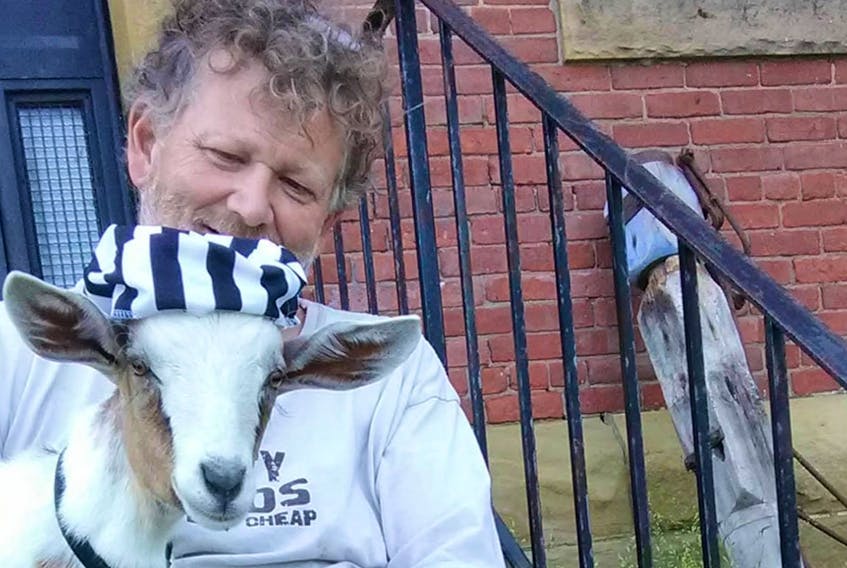SACKVILLE, N.B. – Bill Steele says he has no intention of finding a new home for his goats.
“I’m keeping my goats, it’s as simple as that,” says the Dorchester resident and business owner.
Steele, who acquired his three new pets a couple of months ago via a Kijiji ad from a woman in Sussex, was recently ordered by the village and the local planning commission to remove his goats from his property. The letter from the Southeast Regional Service Commission states that keeping farm animals is an agricultural activity, not permitted in the village centre zone.
Steele, the owner of Dorchester’s historic jail which he has turned into a bed and breakfast within the heart of the community, says he was disheartened by the letter, which says he has until July 20 to find alternative accommodations for his goats or legal action may be taken.
“These sweet little goats aren’t hurting anyone. It’s no big crime. Why are they going after an old retired guy with three goats that people love?”
The goats - Rhea, Princess and Deputy Mayor - are not considered household pets, according to the zoning bylaw. The bylaw states that a household pet is defined as a domestic animal customarily kept within a dwelling or in an outside pen or accessory building for the sole purpose of pleasure rather than utility, and includes dogs, cats, rabbits, rodents and small birds and other animals, but excludes cattle, sheep, horses, pigs, poultry, bees, goats, and other animals normally raised on farms as well as exotic animals such as snakes, lions and llamas.
“The restrictions are crazy,” argues Steele. “They say my property is not zoned for traditional farm animals. But to be clear, I’m not a traditional person. I don’t have traditional pets. I live in a jail.”
Steele says he purchased the goats as well as five chickens in the hopes of attracting more visitors to his Airbnb. They’ve settled in well on the eight-acre property, he says, which features a fenced-in prison yard as well as an area where he has constructed a pen and a shelter. The goats have been a hit with the guests and Steele says they’re not going anywhere.
“I’m just trying to have some fun here. They’re not hurting anyone,” he says. “These are my pets and they’re not taking them. They can take me to court . . . I’m not giving up.”
Steele says when he moved here from Ontario last spring and began opening up the jail to overnight guests a few months later, he felt like the village council was supportive of his efforts to breathe new life into the community. Now he’s not so sure.
Village officials say they are simply following the bylaws that are in place, which include zoning requirements, although residents are free to request amendments to those bylaws.
Mayor Jerome Bear says the village has worked with others in the past to amend a bylaw and this has been done through the proper channels.
“It is our responsibility to work with the people in the village should there be concerns raised about our bylaws and it is asked that people bring the concern forward to the Southeast Regional Service Commission planning division,” Bear stated in a media release.
Steele has the option of applying for an amendment to the village zoning bylaw, at a cost of $1,500, although there is no guarantee the amendment would be approved.
Otherwise, he has been asked to find an alternative location for his goats either outside the village centre zone on a property that has an existing agricultural operation or outside village limits.
The media release from the village of Dorchester confirmed that complaints were received by the SERSC planning division about farm animals being housed in the downtown core zoning area and the planning division sent a letter requesting that they be moved to another location until such time that the proper procedures can be followed to request an amendment to the zoning.
“As a council, we are not saying we are for or against the farm animals being housed in the downtown core,” states Mayor Bear. “We only ask that the issue be brought forward to us using the procedures detailed in the (Community Planning) Act and bylaw.”
Steele argues that the village, however, is being unreasonable and says council could easily vote to approve a simple variation to what he calls an antiquated bylaw rather than go through a lengthy and drawn-out process.
He says he also asked for an extension to the July 20 deadline, as he plans to board the goats and chickens at a farm for the winter, but was turned down. So he really doesn’t have faith that council will agree to an amendment, even if he dished out the $1,500 to make the request.
“I’m not going to go that route for three goats,” he says.
Steele says instead he continues to be buoyed by the public support he has been garnering over the past couple of weeks. A Facebook page he has started, called Save the Dorchester Jail Goats, now has over 1,800 members.
But not all residents are on board with Steele’s approach in trying to keep his goats and argue that all property and business owners are subject to the same guidelines.
“I am unsure why Mr. Steele feels treated unfairly by such a reasonable request and feels the requirement indicates lack of support (from council),” says Kara Feindel, a longtime resident of the village.
Feindel says bylaws are in place for a reason and it should be expected the village enforce them, as that is the municipality’s role. She said she is not aware of any other community that permits goats within the town centres.
“I commend them for doing what is right despite the media pressure and other tactics that have been used to try and run them over,” she says.
There is a procedure in place for amendments and that should be followed, says Feindel.
“It’s not a difficult procedure and I was at a town meeting just last month where a request for a variance was considered.”
Feindel says she is also concerned over how this controversy might impact the village, adding the “trial by social media” approach is disappointing and is creating divisiveness in the community.
“That will not attract new residents or business to our beautiful village,” she says.
“I am not opposed to someone trying to make a go of it in Dorchester, but be civil, follow the rules and let’s work together.”









